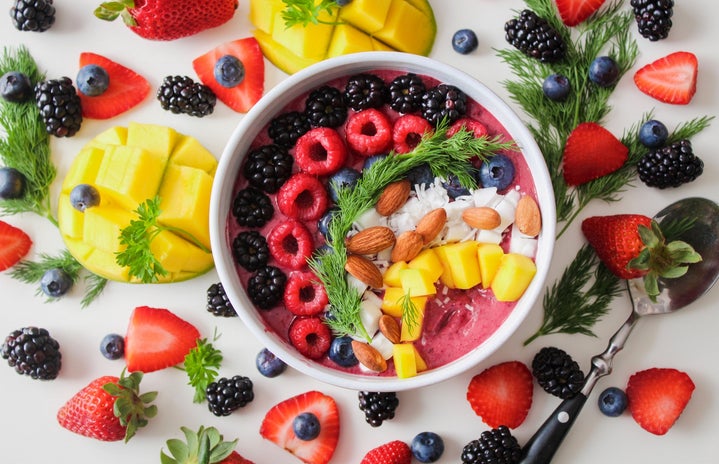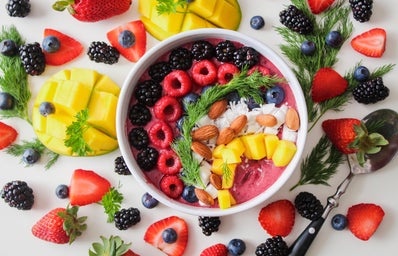We’ve been told all our lives that eating things like fruits and vegetables will improve our physical health, but certain foods can help our minds perform optimally as well. The gut-brain axis is a direct communication system between your brain and digestive system, which are more closely connected than they seem. There are trillions of microorganisms in your digestive system that make up your gut microbiome, and because of the gut-brain axis, a change in that microbiome can directly impact your mental health. So, what are some foods that can change your gut and brain for the better?
Here are eight foods to consider adding to your diet to improve your physical and mental health.
Note: I am not a medical professional, and you should consult with your doctor before dramatically altering your diet.
- leafy green vegetables
-
We’ve all been told to eat our vegetables, but our parents really did have our best interests at heart when they forced us to eat salad with dinner. Leafy green vegetables, like spinach or kale, have countless health benefits – importantly, they have been indirectly associated with cognitive decline. They have also been shown to decrease depressive symptoms. Long story short, incorporating leafy green veggies into your diet will do you a whole lot of good.
To add more leafy green vegetables to your diet, try blending them in a smoothie, cooking them into pasta sauce, or adding them as pizza or sandwich toppings.
- yogurt
-
Probiotics are live microorganisms that generally act to improve the gut microbiome. They have also recently been shown to boost cognitive function. The probiotics found in foods like yogurt or other low-fat dairy products are thought to decrease depressive symptoms as well, although more research is needed to confirm this.
To add more yogurt to your diet, try making a parfait with granola and fruit or using yogurt instead of sour cream in recipes.
- whole grains
-
Whole grains are complex carbohydrates that work to maintain steady blood sugar levels. They also contain the amino acid tryptophan that the body needs to produce serotonin and melatonin, stabilizing your mood and maintaining healthy sleep.
To add more whole grains to your diet, try picking up brown rice instead of white rice, making a sandwich on whole grain bread, or eating oatmeal for breakfast.
- blueberries
-
Blueberries are often considered a “superfood” because of all of the health benefits they offer. Blueberries are high in antioxidants, which protect your cells from damaging free radicals. These antioxidants contribute to improving concentration and decreasing risks of dementia or memory loss. Finally, blueberries are nutrient dense, containing fiber, Vitamin C, Vitamin K, and more.
To add more blueberries to your diet, try adding them to a smoothie or using them as toppings on a yogurt bowl or salad.
- walnuts
-
Several nuts, seeds, and legumes are brain-healthy foods, but walnuts have high levels of omega-3 fatty acids and protein that helps maintain blood sugar. One study found that adults who ate walnuts had higher levels of optimism, energy, hope, and a greater interest in activities. Further, depression scores were 26% lower among those who ate walnuts on a regular basis.
To add more walnuts to your diet, try chopping them up and adding them to a salad or adding them to your baking recipes.
- dark chocolate
-
Yes, chocolate is on this list! There is evidence showing dark chocolate lowers the risk of depression. It also was shown to relieve feelings of anxiety and irritability, common symptoms of several mental illnesses. Dark chocolate is often better for your brain health than milk or white chocolate, due to its high cocoa and low sugar content. Obviously, consuming dark chocolate (or any foods on this list) in excess could be an issue, but in moderation dark chocolate is a great way to keep your mind and body sharp.
To add more dark chocolate to your diet, try baking with dark chocolate chips or buying a dark chocolate bar at a store like Trader Joe’s.
- oily fish
-
Oily fish, like salmon, are high in omega-3 fatty acids, which prevent blood clotting and inflammation. It’s important to get omega-3s from our diet because our brains do not produce them. Oily fish have also been shown to prevent or moderate ill effects from depression or bipolar disorder.
To add more oily fish to your diet, try grilling salmon, trying new fish like trout, or making tuna salad.
- fermented foods
-
Fermented foods, like pickles, sauerkraut, or kimchi, increase microbiome diversity in your gut. Broadening the diversity of microorganisms in your gut microbiome can boost your immune response, but there are mental benefits as well. Several studies have shown that eating fermented foods on a regular basis may decrease the severity of anxiety and depression symptoms.
To add more fermented foods to your diet, try adding pickles to your sandwich or eating kimchi on the side of rice or noodles.
The foods that we eat have a direct impact on our mental health, so incorporating these foods will only benefit us in the long run. Of course, only eating so-called “healthy” foods isn’t sustainable, either – you should absolutely still enjoy that pizza and ice cream! However, even adding one or two of the foods on this list into your diet could make a difference in how you feel, both physically and mentally.
For more detailed information about foods that help with each mental illness, I highly recommend the book “This Is Your Brain On Food” by Uma Naidoo.







